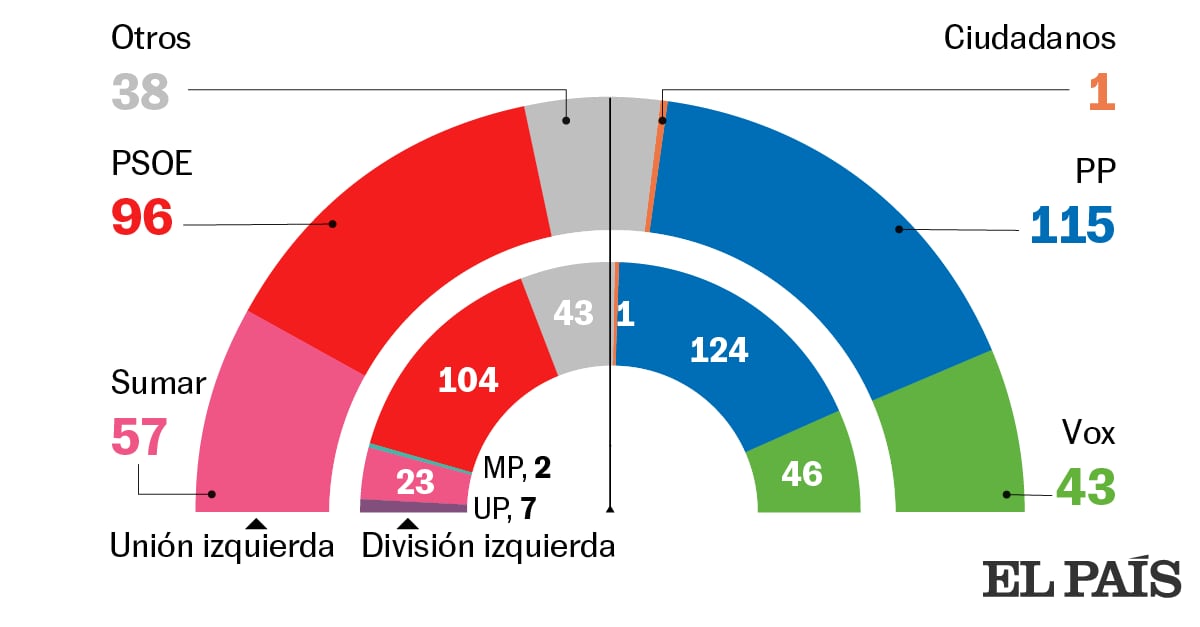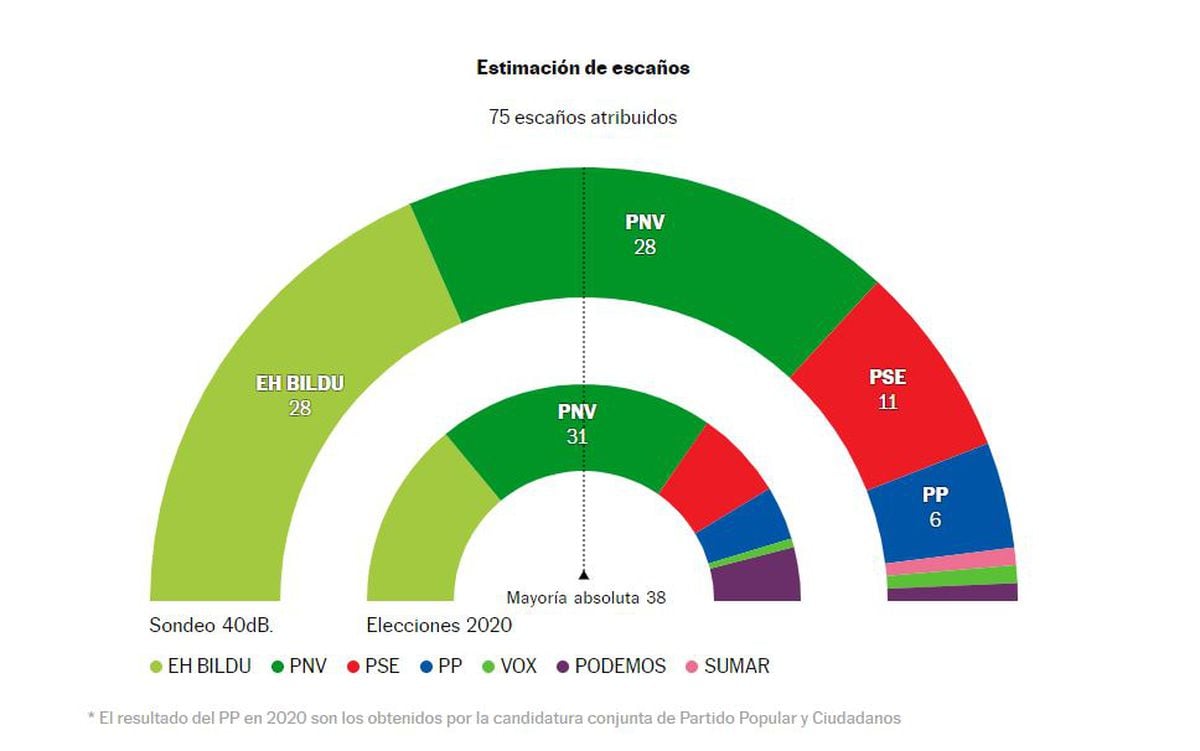The key to the next general elections may lie in the space to the left of the PSOE.
That is the clearest conclusion of the first in-depth poll study on the different electoral options that are now being considered in this field.
If Sumar, the fledgling platform promoted by the second vice president of the Government, Yolanda Díaz, managed to bring together all that space, it would be in a position to obtain a great result, up to 57 seats —19 more than those won by the group of these forces in 2019. —, according to the calculations of the work of 40dB.
for the December barometer of EL PAÍS and Cadena SER.
The PSOE would be faced with a paradoxical effect: it would cede ground to Sumar and at the same time the new platform would greatly increase Pedro Sánchez's options to repeat the Government.
Instead,
Estimation of seats (split on the left)
350 seats allocated
* Others include ERC (12), JxC (8), PNV (6), Bildu (4), NA+ (2), Coalición Canaria (2), BNG (1), CUP (1), PRC (1) and Teruel There is (1).
The survey has been prepared conjecturing two scenarios.
The first would be a Sumar candidacy that would absorb everything that is now sheltered under the umbrella of United We Can, with the addition of Íñigo Errejón's Más País and his territorial allies.
The second would be drawn by a total division, with each force competing alone.
The results differ like day and night.
In the first of the hypotheses, a parliamentary majority similar to the current one would be configured that would allow Sánchez to revalidate his government, despite the fact that the PSOE would cede some ground.
In the second, the group on the right borders on the absolute majority.
All the internal data from the survey can be consulted on the websites of EL PAÍS and Cadena SER.
our map
In the unity scenario, demographic research encourages great expectations for a candidacy with Díaz at the helm, which would rise to 18.7% of the votes, close to the best marks of the first Podemos.
The set of these formations now regrouped would improve by more than three points what UP and Más País added separately in 2019. The PSOE would suffer a downturn, up to 96 seats.
The two partners of the current Government, with Errejón incorporated, would have 153 deputies, five less than now, but seven more than those given by the survey published this Monday, in which only the electoral brands still in force are considered.
The absolute majority of Congress together with those who have been its allies this legislature would be guaranteed.
The magnitude of the punishment that the electoral system inflicts on the dispersion of forces is evident in the second scenario: that Sumar, Podemos, Izquierda Unida and Más País each competed on their own.
The PSOE would go up a bit, up to 104, which would be useless for their aspirations for government.
Díaz's platform would remain with 9.1% of the votes and 23 seats;
We can, with 5.9% and seven seats;
and Más País-Equo-Compromís, with 1.9% and only two.
The 2.4% of UI, being more dispersed, would not provide any representation.
Together, they would have six fewer seats in Congress than they now hold and a whopping 25 fewer compared to the forecasts for the electoral union.
On the other hand, the forces of the right (PP, Vox, UPN and Ciudadanos) would add 173 parliamentarians, with a margin to complete the majority.
The enormous difference between the two scenarios, due to the complexities of the electoral system, is even more obvious if the forecasts for the right are compared.
In the hypothesis of the unity of the left, the PP remains at 115 seats and Vox at 43. In the rupture, the popular ones go up to 124 and those of Santiago Abascal go up to 46. The sum of the two parties of the right shows a difference of 12 parliamentarians more or less depending on how the electoral offer is configured to the left of the PSOE.
Those 12 deputies would be key to leaving the right-wing coalition on the verge of an absolute majority.
Beyond the pure electoral mechanics, the survey offers other data that explain the good expectations that the recomposition under the Sumar brand of the analyzed political space would generate.
On the one hand, there is the figure of Díaz, who vastly exceeds all others in this field in popularity.
Among the general population, he preferred it by almost 48%, compared to 19% for Errejón, 7.6% for Pablo Iglesias and 7% for Irene Montero.
Díaz is highly valued by the PSOE electorate and, as all the polls have been confirming for some time, she arouses less rejection and is seen as more moderate and conciliatory than the leaders of Podemos and Errejón.
That would allow a single candidacy headed by the vice president to snatch 15% of their voters from the PSOE.
In absolute terms,
one million votes taking as reference the last elections.
The reunification under the Sumar brand also shows greater mobilizing capacity.
According to data from 40dB., 9.2% of those who declare themselves willing to vote for it are former abstentionists.
In the rupture scenario, Podemos would take the biggest bite out of those who bet on UP in 2019. A third of them would go with the party led by Ione Belarra, while only a quarter would prefer Sumar.
And despite that, Díaz's platform would surpass Podemos, because it would incorporate 12.4% of the socialist electorate and almost 40% of those who three years ago opted for Errejón, even if he decided to run in lonely.
About another 10% of the old UP electorate would prefer the PSOE in this hypothesis.






/cloudfront-eu-central-1.images.arcpublishing.com/prisa/5C635RG6YBGDPHDHXEOSQWFQ2Y.jpg)


/cloudfront-eu-central-1.images.arcpublishing.com/prisa/QZCJZN3NI5CJXJCSYHFDKA4G3A.jpg)